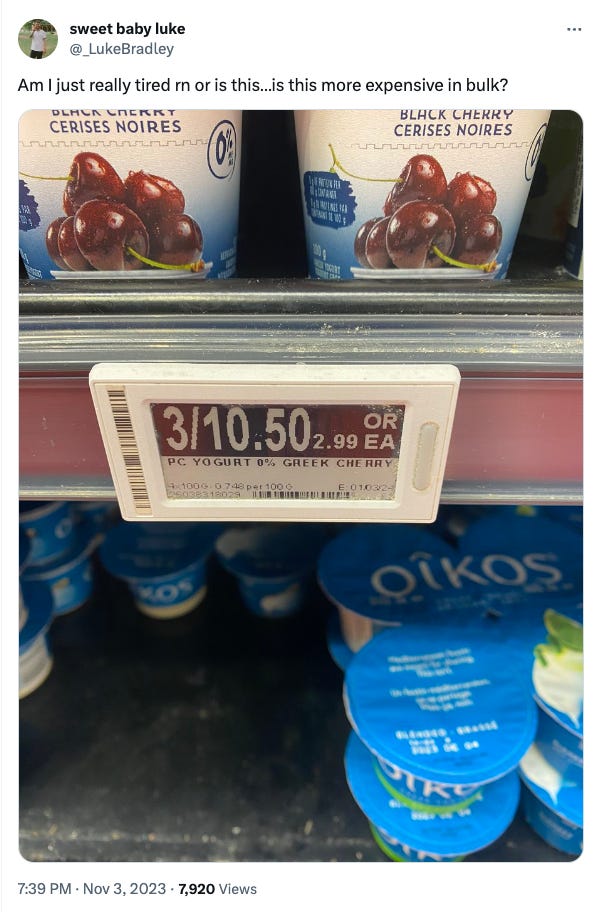🏋️ bulking up
🛒 when buying more costs…more (per unit)
😅 This post is about both sides of the bulk question. “I’ve been bulking up”!
The first is whether and when it can hurt people to only offer a per unit discount IF a certain number of products are sold together. People with low(er) incomes or people that live individually and may not be able to consume an item in time are disadvantaged. But there are some workarounds, like teaming up with a friend or friends to purchase or (I guess) buying in bulk and then processing a return (tedious). Saving at the margins on certain items when you purchase more than one is something people seem to be familiar with and unbothered by.
The other side is more egregious: it’s when buying in bulk is literally more expensive than if you purchased the same item individually multiple times and just added it up.
It seems that on social media, people are picking up on deceptive architecture on price labelling that trumpets an all-in price for buying 2 or 3 or 4 (or more) that’s actually more expensive than the advertised per-unit price of just one item.
Why would buying more inflate the price? It defies logic, unless it is intended to deter bulk purchasing (?). I can’t help but think of Harry Brignull’s excellent book (and Twitter threads) on “Deceptive Patterns: Exposing the Tricks Tech Companies Use to Control You.” His focus is digital but this seems like an example of “misdirection.” It’s like a deceitful tech tactic in a brick and mortar setting. Or nudge theory gone wrong in the grocery aisle. Deceptive architecture lures us to make decisions that go against our interests or interfere with our autonomy. The ‘nudging’ happens to us often online, and you probably don’t really notice it - not noticing is sort of the point.
We have federal rules around false and misleading advertising through the Competition Act. I think it’s fair to assert that these bulk ‘discount’ claims that-are-actually-more-expensive - however rare - are designed to mislead. We also have rules around labelling, but they pertain to the contents (ingredients/components) and geographic origins of an item and aren’t related to the signalling we see on a shelf. Some have called for the practice of unit pricing to be mandatory (in Canada, it’s only legislated in Quebec).That seems like an easy win for the province.
So the question is: Is it misleading to make the bulk price of food higher, knowing the consumer presumes that buying more introduces some savings? It’s not like the lowest price is actually the law or anything (#Zellers). This is an example of a practice that is sporadic and difficult to detect, but totally sucks.
The federal government has recently tripled consumer advocacy funding to support research and consumer awareness as part of the plan to tackle food inflation in Canada. The goal is to allow the government to expand the scope of existing consumer projects to increase the scope of consumer projects to increase research in the retail sector, including groceries.
This seems like a great research project on a practice that is harmful to consumers. But why not also crowdsource from the eagle-eyed consumers that are already taking the time to read the fine print here? It wouldn’t be that hard to pay attention to what people are already calling out.
I also want to (try to) V-assume the very best intentions here - that it’s just the result of rushing or genuinely poor arithmetic. If it’s not, what we are seeing is a deceptive pricing practice designed to nudge people to buy more, and pay more as a result. You also have to wonder if the grocery store(s) can feign innocence here: after all, they aren’t explicitly saying that the larger font is the better deal. Is this so they can tell the Minister that they have lower (per unit) prices, while pushing people towards volume buying that instantly negates that discount? That's my little conspiracy theory.
😡 Sometimes, it’s the little things that can unlock your inner incredible Hulk (in this case, incredible bulk?).
UPDATE: A regs reader let me know that this is called ‘double ticketing,’ when you charge someone the higher of two prices and it is CRIMINAL.
BTW, I am lurching back to ‘real’ life this month. Maybe we can hang?
November 13th (7.00 pm) - I’ll be interviewing Naomi Alderman about her new book The Future at the Toronto Reference Library. Join us!
November 16th (7.00 pm) - I’ll be in Stratford with Cory Doctorow as part of the Provocation Ideas Festival. We’ll be in conversation with Nahlah Ayed of CBC IDEAS and you can register here. 💡
November 22nd (7.00 pm) - I’ll interview Cory at the Toronto Reference Library (also 7.00 pm). I can’t share a registration link just yet because of the TPL cybersecurity incident. 😬
November 27th (6:00 pm) - I’m facilitating an optional activity ahead of Frances Haugen’s lecture at the Toronto Reference Library. Hint: it’s all about platform governance. 🦩
November 28th - Hosting the Writers’ Trust of Canada’s Balsillie Prize for Public Policy, celebrating good ideas and great people. 📖











